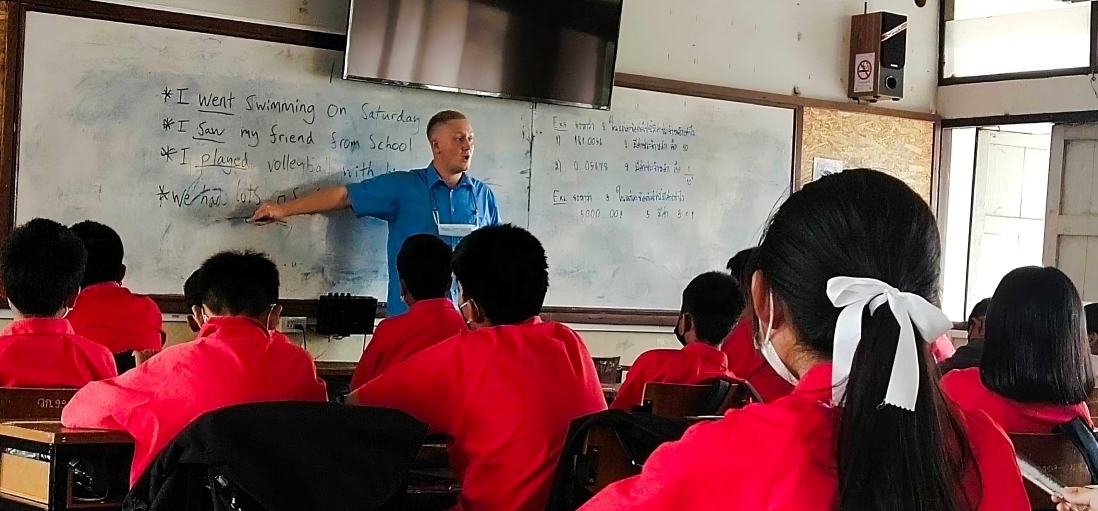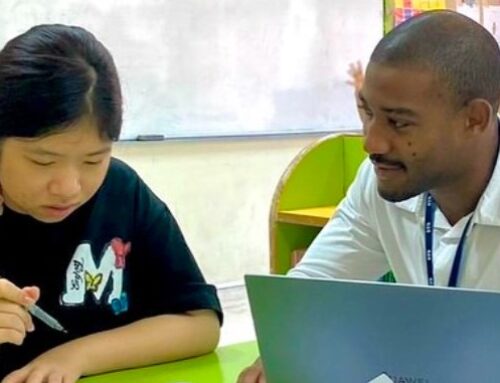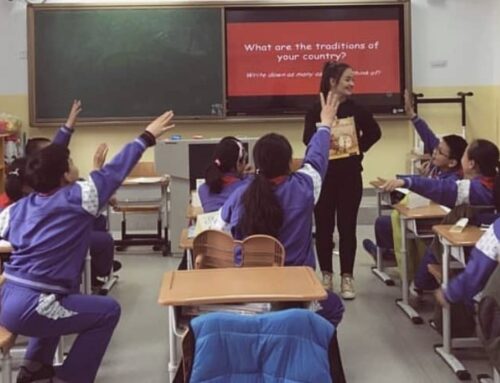This is a question that arises a lot when we visit universities and speak to candidates. The simple answer is – easily! Whether they are teaching in China, Poland, or anywhere in between, the majority of our teachers cannot speak a word of the local language when they step into the classroom on their first day.
There are three main circumstances that I will discuss in this article, that will hopefully put your mind at ease if you are worrying about a lack of communication between yourself and your future students. And it might also help you decide what type of student you would prefer to teach. Read on to find out.
Advanced learners
We offer a wide range of teaching opportunities across our programs, from homeroom kindergartens to one-to-one adult tutoring. Many of our teachers work with advanced learners, and if that’s something that you prefer, we can help you achieve it. As you may imagine, not speaking the local language when teaching advanced learners isn’t a problem. Why? Because the student’s English is good enough to communicate efficiently, and possibly to even have complex conversations. In some cases, especially in China, this can arise with young teenagers who have been learning English since they were old enough to speak.

Working with advanced learners can also be very rewarding. One of our experienced teachers from Scotland who lives and works in Warsaw, Ken, wrote a blog all about it. So, not speaking the local language is nothing to worry about when it comes to older or more experienced students. It’s also a great way to pick up bits of the local language, if that’s something that’s important to you, as students are often keen to share their language with their teachers. And it’s fun, as you can have deeper conversations, debates, and really learn a lot about the culture of the country you are in from your students.
Young or less advanced learners
A lack of local language knowledge is obviously not going to cause too many issues when teaching advanced learners, but how about with young students or those with a lower level of English? Your solution comes in the form of a co-teacher or teaching assistant. These saints in normal clothing will be local teachers who usually have a good level of English. They’re not there to translate your lesson word for word, but they can help explain things like games or more complicated parts of the content to students. Often, they will also assist with classroom management if any problems arise.

But despite a good co-teacher or teaching assistant being a fantastic asset to have by your side, they’re not always perfect. When they’re good, they’re good. But there are a small majority that will see your class as an opportunity to catch up on other work, or even rest. Local teachers have a significantly heavier workload than foreign teachers, andoften get paid a lot less. The po
int I am trying to make here is that although they’re great, co-teachers and teaching assistants shouldn’t be relied upon or put under pressure to support you too much, especially once you are established. But with that in mind, how on earth do you teach without the local language or partner to help you? I’ll tell all in the next section.
Winging it
First of all, it’s important to remember that you are not the first person who has taught abroad without speaking a word of the local language. Many have done it before with great success. So although it’s daunting, just know that it can be done. Like I mentioned before, it’s not an issue with advanced learners. With younger and less advanced students, there are several methods and tricks to keep safe up your sleeve, most importantly is the ability to wing it. Do not overthink the fact that your students aren’t understanding 100% of what you’re saying. What’s far more important is that they’re having fun, getting excited about English and your classes, and if they are only getting 5-10% of what you’re saying – great.
 Always speak slowly, keep your vocabulary simple, use images, props, and repetition is a great way for students to make significant progress in a short space of time. Play games, they’re a brilliant way to reward students for focus and hard work. In most classes, there is one or a few students who have a level of English great than their colleagues. Use them, get them to explain things and help their classmates understand. But the end of the day, after a few classes, you’re confidence will be sky high. Of course the first few can be scary, but if you do your research, prepare simple but engaging classes, and have the ability to be flexible, I am sure you’ll find success. Especially if you are motivated enough this far down in the article.
Always speak slowly, keep your vocabulary simple, use images, props, and repetition is a great way for students to make significant progress in a short space of time. Play games, they’re a brilliant way to reward students for focus and hard work. In most classes, there is one or a few students who have a level of English great than their colleagues. Use them, get them to explain things and help their classmates understand. But the end of the day, after a few classes, you’re confidence will be sky high. Of course the first few can be scary, but if you do your research, prepare simple but engaging classes, and have the ability to be flexible, I am sure you’ll find success. Especially if you are motivated enough this far down in the article.
In summary, teaching abroad without any knowledge of the local language can be done, easily. You will either be working with a co-teacher or teaching assistant, or have students who have a level of English that is good enough to communicate. One important thing to also remember is that the pressure you feel will most likely be self-inflicted. The management and teachers at your school will not be expecting perfection on day one. As long as you do your best, are positive, energetic, and engaging, you’ll be fine. And we are here to help. We support our teachers with training pre and post departure, if they are having issues with teaching or anything else, we’re on the end of a call or Zoom.
If you want to learn more about teaching abroad, then check out the rest of our website. Or send us a message here. We’d love to speak so please don’t hesitate to ask any questions you may have. We offer placements in China, Hungary, Poland, Thailand, and Vietnam. So, where will you make your impact?




